Sacha Baron Cohen, a British comedian you have probably seen before in one of his monikers, once mediated peace talks in the Middle East. His goal was to find one thing that they can agree on. The subject that everyone in the room found agreeable? Love for hummus is universal.
Since I saw that bit I always associated hummus with universal goodness. It makes sense because when you’re eating hummus you’re literally breaking bread with whoever you are with. So, I associate hummus with peace, and now you will too.
Recently, I went out to meet the King of Hummus, Jesse Wolfe. He has swum with the sharks, reinvented a product category, sold his product at farmer’s markets & used an incredible resourceful network at UCF to become a true entrepreneurial success story. Although I’ve met Jesse in the past several times we’ve never gotten the chance to have a deeper conversation. Until now!
[Setting: I met Jesse at Wall Crawl, which coincidentally is owned by a photographer for many of my Outrageously Remarkable interviews Joshua Johnson and his wife, who I interviewed previously, Jeanette Johnson. It was the perfect location for us to talk entrepreneurial shop & get to know more about O’Dang Hummus.]
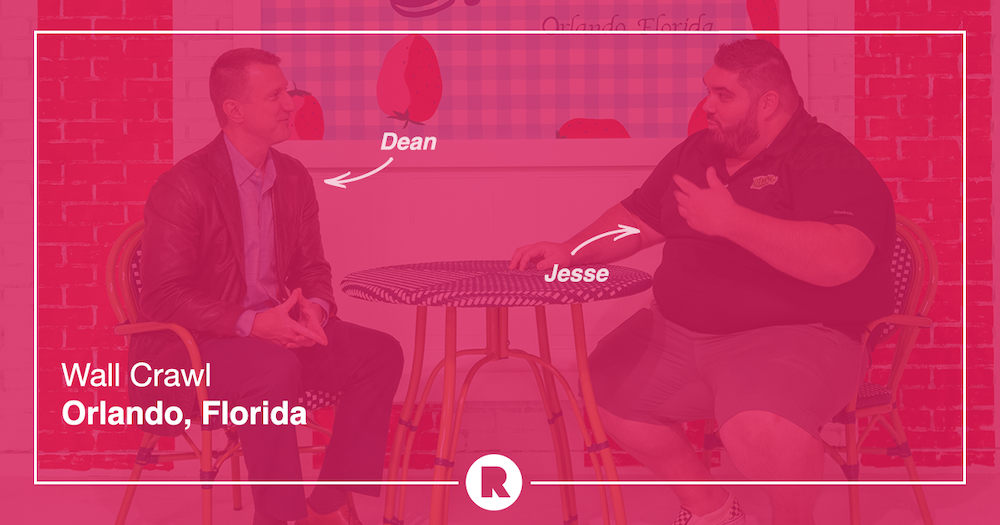
Dean: So, first, thank you for fitting me into your busy schedule.
Jesse: Thanks for, staying persistent because my communication skills have been improving, but they have a lot to go.
Dean: Why hummus? Did you fall into it or is this something all along that you a passion for?
Jesse: That’s a great question that I get a lot and it’s funny because there’s serendipity, like just these serendipitous moments that hit in life sometimes that you don’t realize are happening until years down the road, right? So I grew up in a smaller town in Ohio basically on a farm in the Midwest. We didn’t have a lot of hummus around there. So, my family’s half Polish and half Native American. My family didn’t even know what hummus was until I was on Shark Tank. I mean, it took that long for them to understand it. So, I started the idea of O’Dang in 2013. I was just kind of getting into hummus six months before that and I’d had my wisdom teeth pulled out and really, I just wanted chicken wings. I’m at home laid up, my face is swollen from that removal, and I was like, you know, they’ve got to have like a buffalo wing dip.
… can you make that for this bridal shower?
So, I went to Publix and they have the most delicious buffalo wing dip, but it still as big chunks of chicken in it, so I couldn’t eat it. I found myself pulling all the chunks of chicken out and then I was left with nothing, basically. I went back and I was like, well, there’s hummus. I like regular hummus, so I was like hummus is a good neutral flavor, so I’ll put some blue cheese and some wing sauce in there and call it a day. I did that and it was awesome, right? So it kind of got my fix for me while I couldn’t chew, but it got soupy. So, I was like, well, I’ll just make my own hummus next time and I’ll put more cool stuff in it.
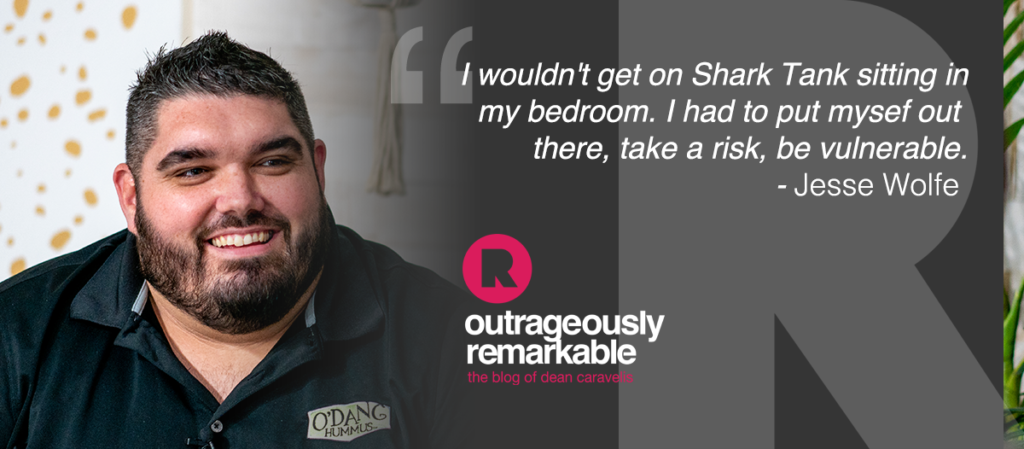
The next day, because I wanted more of it, I learned how to make hummus from YouTube and the first couple of batches were terrible, but then I got much better at it quickly, and by quickly, I mean that week. By the end of the week, I was like just bored at home laid up couldn’t do much and I was just having fun making these hummus dips, and I was just seeing how far I could take the flavor profiles.
My whole family cooked, we farmed, we had fresh produce. Cooking was second nature. We didn’t go out to eat a whole lot, so I love cooking and I wanted to be a chef, but my parents are like, you know, go to college and afterward, you can become a chef. I wanted to go to culinary school and I never made it, you know. I joke about it now that I wanted to make hummus and I never looked back. So, the passion for cooking kind of came through at that moment. I was having fun riffing on these different flavors and by the end of the week, my friends are coming over, my family was checking on me and there was like 45 pounds of hummus there. I was sending it off with people just get to rid of it. Weeks later, I’m getting requests for more, like can you make that for this bridal shower? Can you make it for my baby shower? And I’m like, what? And then it kind of hit me, like hey, maybe I’m onto something here.
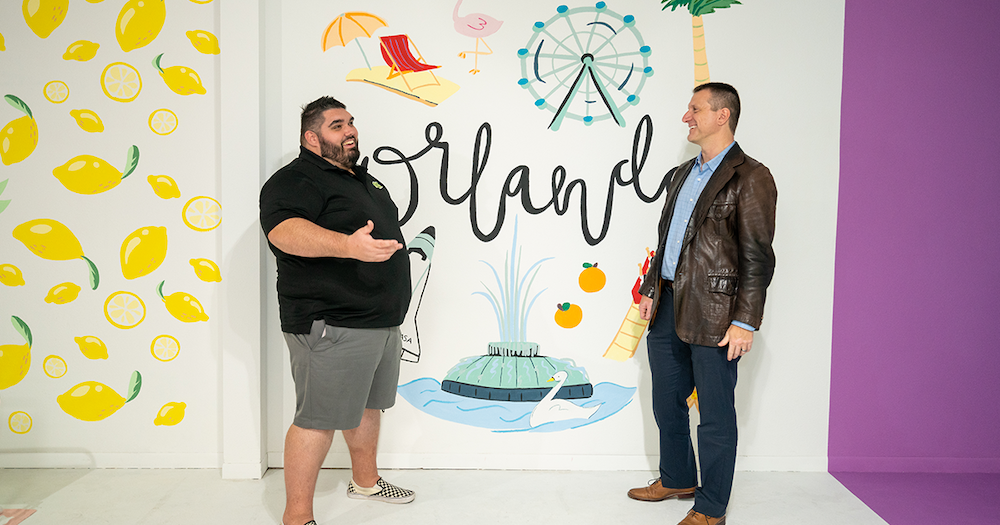
Dean: Was 2013 the same year that you entered The Joust competition at UCF Business?
We are the Ben & Jerry’s of hummus …
Jesse: Yeah, it was actually. I did the business plan competition that spring. I did the business plan competition because that same spring I had to take a class for writing a business plan and so all the pieces kind of fell in place, which was cool. When I did the plan for the class, I realized holy cow, there’s a huge market for this. It’s growing super fast. I don’t really know the industry, but let’s give it a try and then when I went to the business plan competition, well now I’m taking it for my friends and family who are a lot of ‘Yes Men’ to now strangers, but real business people. They were validating a lot of cool things that we were doing, that we were onto, and when we beat out a lot of tech companies and those type of cool startups that are big trendy startups, I was like wow, we have an opportunity here to do something cool. So, that was kind of the initial ‘aha’ moment that being this different Ben and Jerry’s of hummus had legs.
Dean: I love that positioning because I think I heard that early on, that you want to be the Ben and Jerry’s of hummus.
… oh crap, what is this about Walmart?
Jesse: Well, yeah, that was it. You know, in an elevator pitch, you get 60 to 90 seconds to pitch the story, to paint the picture. We are the Ben & Jerry’s of hummus … it resonates right away. Everyone knows Ben and Jerry’s, they know what it is, so I always encourage people that when they’re doing their business, kind of associate yourself with something that the general public knows right. You want to be the disrupter. Well, what kind of disrupter, right? I got great feedback that being the Ben and Jerry’s hummus resonated and then he gave me more time to explain how we make money, right?
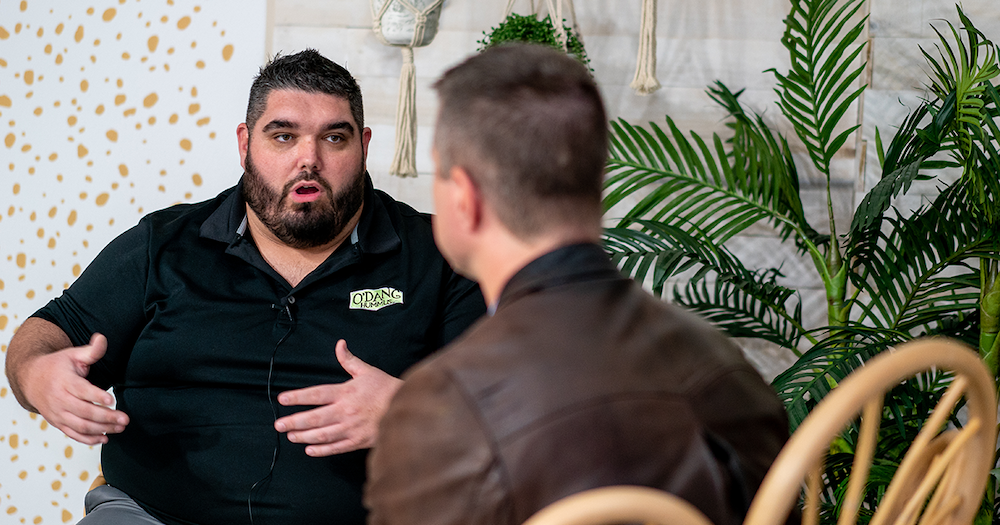
Dean: Any tips on how you’ve been so resourceful to get so much done in a relatively short period of time?
Jesse: Yeah, so we didn’t launch officially until April 2014. Almost a full year after that competition. It was overwhelming because I get a lot of people that every day email me and go, “I want to start a business but I don’t know how.” And it is overwhelming because if you’re going to eat an apple, you don’t put the whole apple in your mouth, right? You eat it one bite at a time. I was stuck in that same rut and I read a book that changed the way I look at things. It’s called the 4-Hour Work Week by Tim Ferriss. Read it if you have it or recommend it to your followers if they haven’t. In there, he says the same thing — one bite at a time and as long as you’re taking a step forward, you’re still moving forward. Whether it’s a big step or a little step, it’s still forward progression. So, another thing that I took away from that book was how to ask for help. It’s one thing to go, “Dean, I need your help.” Well, if I ask you in the middle of your workday, at 10:30 in the morning on a Monday, I’m probably not going to get your help. I get a lot of people that will email me and in the subject line, they put like ‘911’ or ‘Walmart,’ and so for me, I’m like, oh crap, what is this about Walmart? And I open it and it says, “Hey Jesse, I saw you at Walmart and I’d like your help.” Well, that’s pretty direct and you just peeved me off because I thought it’s like an emergency with Walmart so, you know, that’s not how you ask for help. In Tim Ferriss’ book, he shows you how to be respectful of people’s time and if I were to ask you for help, I would not go, “I would like to take you out to lunch and spend two hours on a Tuesday asking you 300 questions.” Instead, “Hey, I’m super respectful of your time, I look up to you, and I would like to follow you. Is it okay if I follow you on LinkedIn or whatever.” Great. Then, you like three or four of their comments over the next couple of weeks. You engage in their posts or whatever, you send them, “I thought of you for this article.” It shows me that wow, they do think about me, they’re not just going for an ask. Once I kind of get that warmed relationship going, I go, “Can I have 10 minutes of your time? You name the time, but literally 10 minutes and not a minute longer.” And you get one question.
… he’s almost practically untouchable, right?
A lot of times, busy people, CEOs, or whoever you’re trying to reach, they’ll give you the 10 minutes and not a minute later because again, they’re testing you, you’re testing them, are you staying true to it? I’ve cracked a lot of doors doing that. I’ll let it go for a couple of weeks. I’ll follow up with a thank you immediately and I won’t bug them, and then I’m like, “Hey, I listened to your response to this, thank you, here’s what I did.” Maybe a month or two later, I’ll ask for another 10-minute call and they’ll say, of course, Jesse, great. Maybe 30 minutes will go by and I’ll say, “I’m way over my 10,” and they’ll say, “No, no, I’ll tell you when to stop.” When they say, “I gotta go,” Okay, bye, click. I stay respectful and because of that process, I’ve had all kinds of resources open up to me. I do that not just online, but I do that with you know, the Incubator, Blackstone Launchpad, Blackstone itself. Tony James is currently the CEO of Blackstone, the largest hedge fund in the world. I’ve had several communications with the guy following that process. I mean, he’s almost practically untouchable, right? So, you know, in the book they tell you can talk to whoever you want, you can get resources from wherever you want, you just have to take the right approach to it. You know, these people that come at me and who go ‘give me, give me, give me’…I would like to help, I wish I could help everybody, but I’m one person and I also have a big business to run, and I’m always gone, traveling is crazy, you know. If you’re persistent, maybe I skip you on the first email, and you follow up nicely on the second email like, okay, I’m still thinking about you. It’s the ones that are like,” I hate you because you forgot about me.” Well, that doesn’t help your case either.
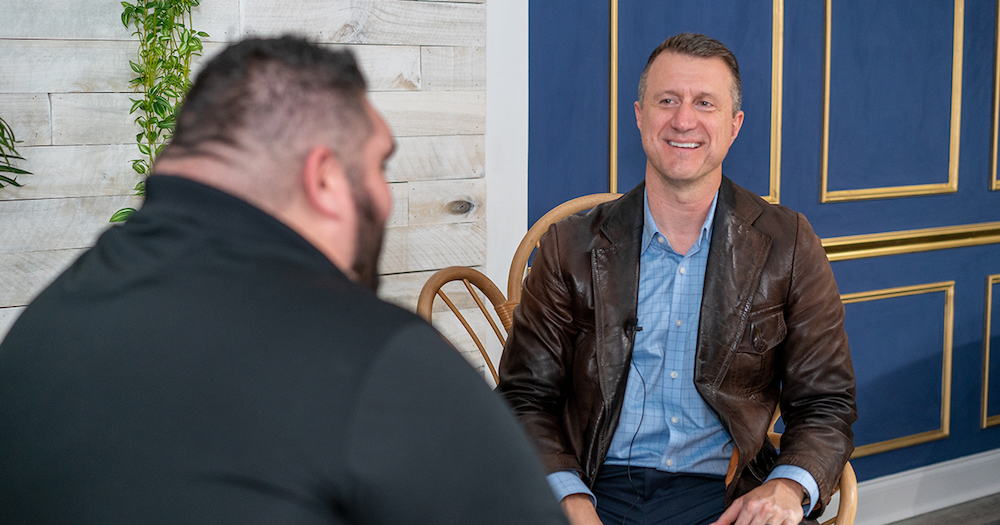
… oh my God, it’s Tom Cruise.
Dean: Some really important points are about asking, but also being appropriate, and being timely. I’m going to bounce around a little bit [with my questions]. How has Shark Tank changed your life?
Jesse: Well, there’s the unexpected celebrity status, I guess we’ll call it, which I’ll use celebrity loosely because I say I’m like a d-list celebrity, but that’s kind of funny because I expected me to be on that show one time. That was the pretense we were under. What I didn’t realize was they would show it again and again and again and again. Well, then what I didn’t realize was that CNBC buys the old episode from ABC so if you have good enough ratings, they’ll buy it. They buy like a third of that season, every season. So, we rerun four times a month for the last three years.
Dean: That’s good brand awareness right there.
Jesse: It’s insane. So, there’s that piece of it. Like, I was just at Target last night. People stare at you and it’s not like you’re Tom Cruise and they’re like, oh my God, it’s Tom Cruise. They’re like, I know that guy from somewhere and I can’t figure it out. Then they go, oh, it’s the hummus guy, and then they come up to me and they’re like, “How is business?” and I’m like, well, it’s 9:45 on a Tuesday…okay, let’s talk business in the middle Target, you know, so that’s fun. I like that. So there’s that piece of it. On the business side, it made me mature as an entrepreneur way quicker than I was ready for.
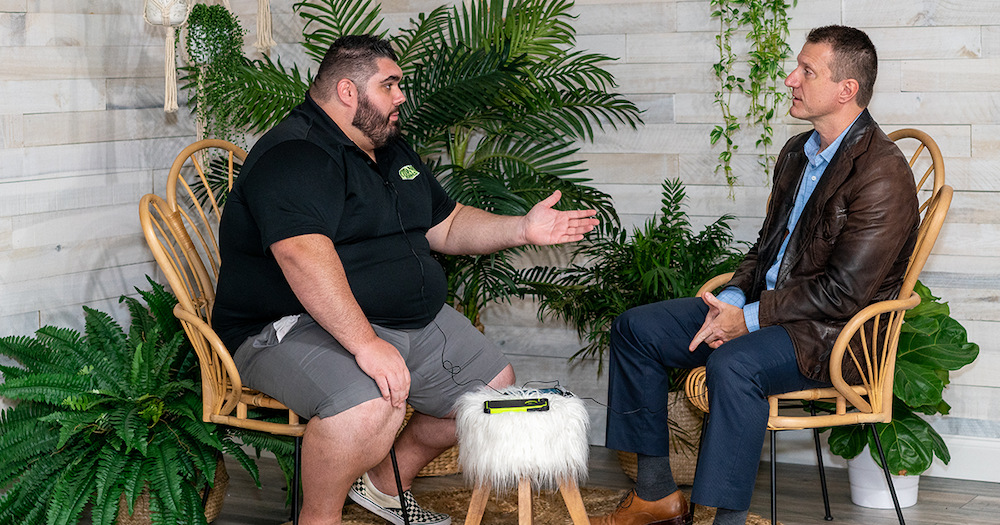
Dean: Did the experience do that or was it the residual effect from the experience?
Jesse: Both. You ever hear the old saying ‘careful what you ask for?’
Dean: Of course.
Jesse: So, that happened with Shark Tank. I was like I’m not going to get on this show. Then, I was like we’ll do it, we’ll sign the contract, what are the odds that we will get on the show? Well, the odds are pretty good, we got on, right? So, from that point I was like, oh my God, like it matured me in the sense of I can get whatever I want in my life if I work hard and I ask the right people and I put myself out there to accept opportunities like that. So like, I wouldn’t get on Shark Tank sitting in my bedroom. I had to put myself out there, take a risk, be vulnerable. So that was a really big eye-opening experience in my life. Then, being on the show, afterward, the business went from 0 to 100 literally in one night. I mean, we went crazy. There’s a lot of bad and good that came from that. We made a lot of mistakes because of just short lead times and crazy demand, and we missed a lot of opportunities because of that, but looking back on it now, I learned a lot of mistakes from that opportunity and I learned a lot of great stuff from the opportunity. So, you know, that whole thing accelerated my business acumen tenfold in maybe what would have taken ten years into like a couple of years. So that whole experience was pretty wild and it didn’t make us…people see you on Shark Tank, like Scrub Daddy, they go on and like three years later they’re a hundred million dollar business. It was the perfect product for Shark, he was at the perfect time of his business, so on and so forth. A lot of companies go on there and they fizzle out.
“So you’re unemployed?”
Just because you’re on there, you might get good brand recognition, but then doesn’t mean you won the lottery ticket. You still have to work your face off and make the opportunity to work for you. So that was pretty cool to kind of see like, you know, maturity-wise just because you get an awesome opportunity like that, if that if I put you on CNBC tomorrow, you’re going on prime time, what are you gonna do with the opportunity after you’re done? Can you build on it? Can you run with it? Can you keep the momentum going? That was kind of fun to learn because I mean, I see a lot of people get on there and they’re overwhelmed. They lose the momentum and they just kind of foil out. So, it’s a kind of a unique opportunity in a lot of ways.
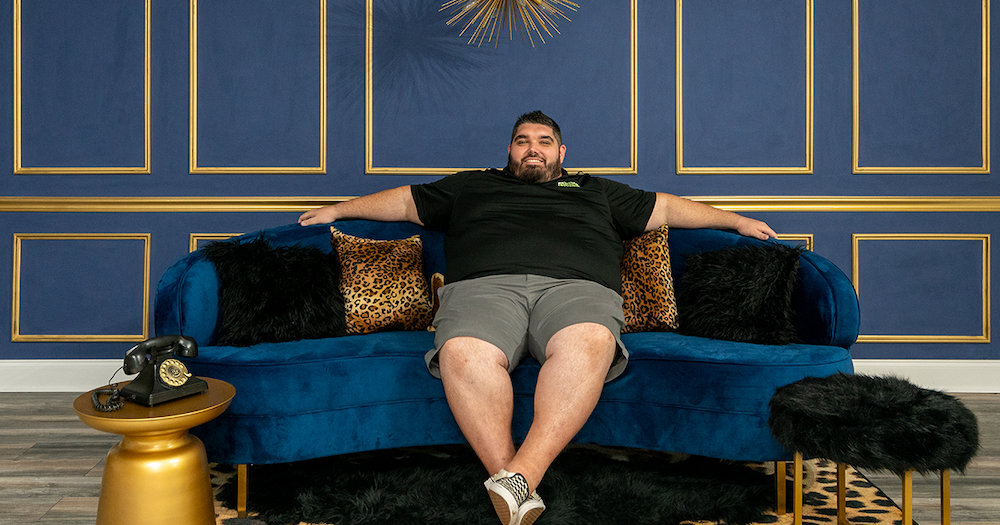
Dean: Well, I’ve seen a lot of people bomb on Shark Tank, but you held your own and you did a really good job. I’m sure it has a lot of staying power for you [since its on] four times a month! Lately, in doing some research about you and every once in awhile, you’ll go on a little bit of a social media rant. You know that I’ve been in entrepreneurship game for over a decade, so you’re preaching to the choir with me, but I wanted to ask you about some of them. Recently, you said that you’re quoting other people that are saying entrepreneurs have it made. Can you expand on that and the fallacy behind that?
Jesse: So, again, whenever you have a business, everybody wants to know how to start a business. Doesn’t matter if you’re on Shark Tank or not, which is great. Right now, entrepreneurship is cool and that’s great because when I was 18 and trying to become an entrepreneur, it was, “So you’re unemployed?” No, like you can be a business owner, but if you said, “I want to be an entrepreneur,” they were like go get a job, you know? Now, being an entrepreneur is awesome, whether you’ve made it or not and there are so many ‘”coaches” that say things like read the books in my garage make a million dollars next year. They have some good material, but a lot of it that they’re making money because you’re buying their courses. That’s their business model. Nothing chaps me more than seeing those type of people get up there and preach about entrepreneurship is great and like work three hours a week and make a million dollars.
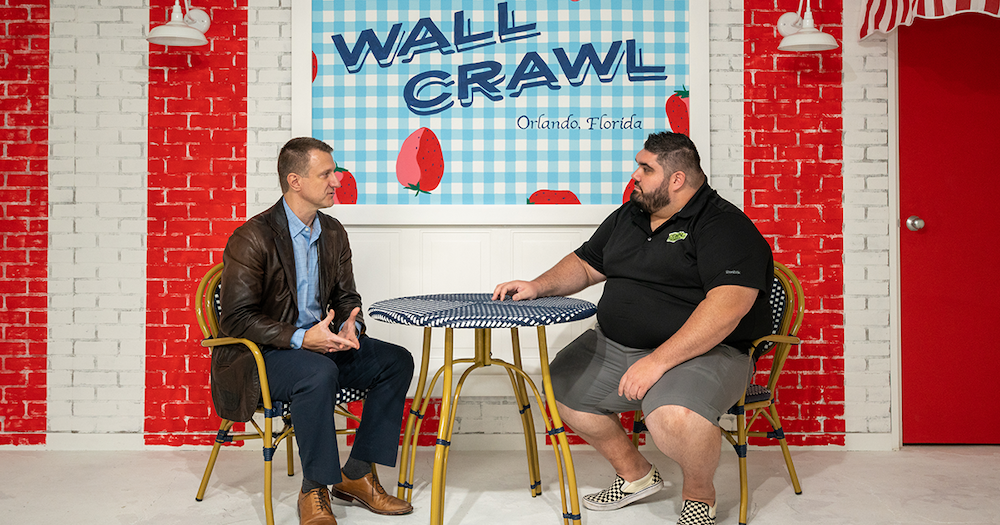
Dean: And have champagne all the time…
Jesse: [laughing] Yeah. It’s amazing the number of people that believe it and like close people to me where I’m like you’re smarter than this, come on, you know that’s not how this works. So, you know, then you see these people that get on Instagram and stuff, business leaders, and they post the inspirational quotes, which can be good, but like I just don’t think there’s a lot of people speaking reality. At the end of the day, I’m still me from the farmers market, I just have a couple more grocery stores.
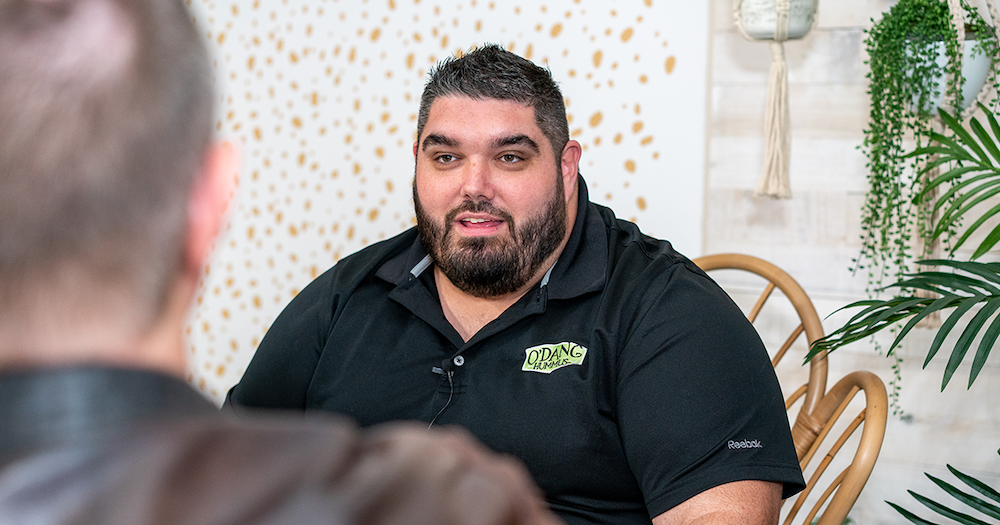
Dean: Yeah, I think I initially saw you there, at the downtown one.
Jesse: Yeah, that was one of my first farmer’s markets. I love helping people as much as I possibly can with my limited time right now, but when I go on these rants, it’s to kind of combat what’s out there. There was a trigger tonight because I get it a lot, and this person emails me and they go, “Well, I want to start a business,” and I had a couple of minutes, so I said, tell me about your business and like what you want to do. They said, “Well, I want residual income to where I can work 15-20 hours a week.” They had this whole plan like they really thought it through, and I wrote him back and I’m like residual income only happens when you have a ton of money to reinvest in other people’s businesses or real estate assets, right? I was like, it’s really hard to create a business and just walk away from it within six months and hope it’s going to throw off cash. Right? Can it be done? I’m sure, but I’m like I’m here to tell you like that’s very slim.
I have to look at the money like it’s Monopoly money.
So, you know, I went on kind of a bender that day just speaking of the truth of you can have anything in this world you want. Anything. I mean, you name it, whatever your dreams are, but you have to work for it. You have to sacrifice and these people, I get it time and time again, oh, you know, I want to start a business. Well, okay, what did you do over the weekend to work towards a goal? Have you done the research? Do you have a business plan? Do you have a business template? Okay, well, you don’t even have your ideas together on paper. Guess how much money it costs to write a business plan? Zero dollars. So start there. It’s amazing how many people when they do that, they work out like, oh, I don’t need money for a while or I can be profitable within X days of opening my doors It’s just crazy how society right now is pumping up the entrepreneurship thing to kind of false levels, in some ways. But yeah, social media is great.
Dean: Over the last couple of years that I’ve been doing these interviews, Imposter Syndrome has popped up with virtually every single person that I’ve talked to. It doesn’t matter what space they’re in, it doesn’t matter what they’re doing, it just pops up. So, I’m assuming it pops up for you. When does it pop up for you? What does that look like? And how do you deal with it?
Jesse: It gets a little terrifying at times just stopping and thinking about like where you’re at. People are like stop smell the roses. Sometimes it’s great to look to see what I’ve done, but sometimes it’s terrifying. You know, you’re like, oh my God, Walmart’s one of my customers? I mean, you almost kind of have to brush it off. Like, how are you so calm about it? That’s my only choice is to pretend it’s casual because I can get too much in my head about it. When we placed purchase orders four years ago, they were for $500. Two years ago, they were for $15,000. Now, they’re $300,000, $400,000, half a million dollars. When we have to cut those checks, I have to look at the money like it’s Monopoly money. I pretend like it’s just credits transferring, you know, because all that will sometimes get in my head and like I could have bought a house cash and you’re throwing it out on salad dressings that you hope we’re going to sell.

Dean: I just want to touch on one point. What maybe people probably don’t understand, in the past, I have done business with Walmart, is risk involved there with returns and everything and how a lot of businesses have gone out of business. And so, I just wanted to put that on the record that it’s not like, oh here comes the money, there’s so much risk when it’s your name on the wall.
Jesse: Well, let’s talk about that for one second. My first grocery store I got into, I learned this quickly, I celebrated when we got in, but guess what happened? It didn’t sell. All the came right back. I didn’t know what I was doing. I put it in the wrong section of the store, I think it was a small store, you know, but I put us in like over by like the specialty jams and stuff, and I’m like that’s not where hummus goes, you know? So, we got kicked out like within three months and I was no longer celebrating and all the money they paid me went right back out? So, you know, that was kind of an eye-opening thing. So, you could celebrate the milestone, but you need to keep your head down and make sure the product turns. To your point, it could come right back and that’s terrifying. So like when you shell out $500,000 and you know, you’re going to get X amount back for that from Walmart, you’re still like it’s got to move and then once it moves, I gotta get another reorder and another reorder and once those reorders start happening, you still can’t really take your foot off the gas, but you can breathe a little bit and with Imposter Syndrome, I get it often, but I just take a breath. I used to get it bad earlier, especially after Shark Tank, it’s like you’re a fraud, you’re a fake, like oh my God, this is going to tank tomorrow and Shark Tank puts so much pressure on you to succeed. If you’re on Shark Tank, how can you fail? That’s embarrassing and I had to get past that. If you fail, you fail. That’s business.
So, for someone of that magnitude to green-light you in your creativity…
Anybody that knows Shark Tank and business understands that, and I learned to not care what people think, period. That was a big thing that really helped me, but fighting the Imposter Syndrome was just kind of a combination of all that, you know, stop caring what people think, stop being so hard on myself, allowing myself…when I was younger and smaller, I would take failures all the time, but they were small failures. Now, they’re massive failures. So, I just had to be more calculated about those and when I do fail, just don’t get inside your head. You take a break, you step back. I mean, and it could be a massive failure. I learned if I get mad at something, I don’t say a word unless a response is required, but I just get up and I peace out for about two hours and I calm down. I let my thoughts collect and then I approached it again. I won’t let it go for more than 24 hours. You know, if it’s in my head for the rest of the night and I’m having this imposter situation, the next day I go clean slate, brother. Let’s do this again. You know, it’s a new day. Try it again because you’re in too deep. I mean, I’ve got too much on the line and if I quit now, I’m going to fail, so you might as well keep trying and if you fail, you fail, but if I quit and get in my head, you’re already failing. So, you just push forward and friends are some damn good people that can be there to help you out when you fall.
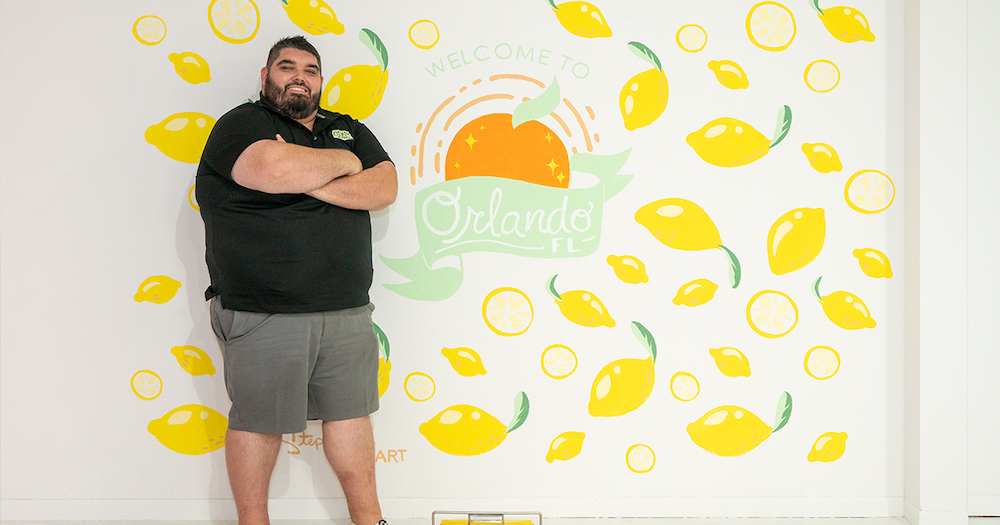
Dean: What’s the most exciting thing going on for you right now that you can share with us?
Jesse: Yeah, there’s some stuff under wraps, but man, there’s a lot of stuff going on right now. You know, we’re growing way faster than I ever dreamt of, Last year we did about 3,000 stores that we got into, which was a huge milestone for us. This year, our aggressive goal was doubling that, so 6,000 stores, and we broke 10,000 in July.
Dean: Wow.
the brands out there that are still making pudding cups should be threatened by this girl.
Jesse: So yeah, so that’s wild and you know that we’ve been known for our hummus dips, but what’s been on fire are these hummus salad dressings. What’s exciting is now we’re kind of at a point where we build these relationships with the buyers at these huge retailers, we’re doing well, they love the innovation, and they’re coming to us and saying bring us more. That’s wild because I had the Walmart buyer go this set of the grocery store, innovate it. Whatever you bring me, I’ll put it in. So, for someone of that magnitude to green-light you in your creativity…and I do the product design, I look at trends in consumer behaviors, and consumer buying habits…that’s like music to my ears. So, we have a new top-secret product line coming out for February 2020 that I’ve been working on like crazy, so I’ve been traveling back and forth between our manufacturing partners across the country getting them ready for distribution so that to me is the coolest thing on earth right now. Yeah, so it’s fun.
Dean: So, I used to ask people what’s their secret to being outrageously remarkable, but lately I’ve been talking a lot about changing the game. You know, flipping the script on things, doing something completely different. So, how are you changing the game?
Jesse: We live in the coolest time. To do whatever your mind can think of or your heart desires, right? So, we have computers in our hands, in our pockets, on us 24/7. You can start a business from your cell phone, which is just wild. There’s no excuse for finding not your passion and doing something with your passion that then will eventually make you money. So for me, I love food, you know, and I didn’t care to own a restaurant. I worked in restaurants through college. They were great, great experiences, but I want nothing to do with actually owning one or running one. I thought I wanted to be a chef in the sense of in the back, writing the menu and stuff, and I realized that the hours for that were just horrendous. That’s a really tough life to have any balance of some sort. You know, I’m an entrepreneur now and it’s awesome [laughs]. My thing is I found this cool, white space of the CPG category (consumer product goods), and I learned quickly that these big guys, Coca-Cola, Nestle, PepsiCo…if they bring something new to market, it takes two to four years. For the small guys like us, it takes us six months, so we can pivot and hit trends way faster than they can, and what I’m doing now is…I learned the industry as best as I possibly could have at this very point and I always look for what I call the Blue Ocean strategy. So, I look at it literally like a blue ocean. Behind me is the beach. A beach represents the grocery store and all the chaos in the grocery store. So, I’ll give you an example for like hummus, right? We saw hummus as the beach. It’s crowded, there’s a bunch of people there, and it was a very competitive set for the hummus dips. We turned around and there’s a wide-open ocean, which represents the rest of the grocery store. So I said, how can I take my chickpeas and the base of hummus, which is a healthy base, and what else can we hummify? It’s what we say internally, hummify. We saw salad dressings. There’s a dormant sleepy category. No innovation. What’s been there is do you want Ranch or now Buffalo Ranch? Exciting. Or…we made a healthy salad dressing, but it’s got nine preservatives, and artificial flavors, and three real ingredients. So, you have to choose. Do you want to eat full fat in a lot less product or you can have a lot more of it, but you’re basically eating a science project. So I said, let’s bring real innovation. Let’s take our hummus base into this category. We did that and it blew up. So now, we look at other categories and I go well, okay, how can we take that logic, that thinking…it doesn’t even have to be hummus anymore. but like, you know, let’s go over to like…I just saw this girl. She did a bang-up job. The pudding cups, you know the chocolate pudding cups? We’ve been eating those since we were kids. This girl decided to go and make plant-based, almond-based pudding cups. So, now they’re somewhat better for you.Who would have thought to mess with that? You want your kid to eat healthily, so you just don’t give them a pudding cup, but now you can give them a pudding cup. So, the cool part is thinking in a whole new light about why do we have to take the pudding cup away? How can I fix the pudding cup to where you can still keep it. That’s what’s exciting in the grocery space now. You can take that thought process into everything. I mean, they’re doing it to cars. Drive your car less, it’s better for the environment. Well, how do I make the car better for the environment so that I could drive it more? Don’t take it away from me, it’s working, right? What are we going to do, go back to riding horses? So, look at Tesla. They, in essence, did the same thing with a car. And that’s what’s bad ass about just innovating. I think innovation is used way too much in Silicon Valley to where people kind of shunned the word, but I still stand behind it because that’s what innovation is. I mean, this girl innovated pudding cups, whether you want to like it or not. We can now eat pudding cups again and to me that’s hysterical, but it’s also gonna be a massive business because the brands out there that are still making pudding cups should be threatened by this girl. You know, she’s going to disrupt the hell out of that category. So it’s fun, you know, and anyone can really disrupt and get in there and change whatever segment they dream of.
Dean: Well, all that sounds tasty to me. Thank you so much for joining me today, Jesse.
Jesse: No problem, I appreciate you.
____________
Go and grab yourself some O’Dang Hummus!
Thanks to Joshua Johnson for the awesome photos.
Want to keep up with Dean’s blog? Subscribe here for fresh perspectives monthly